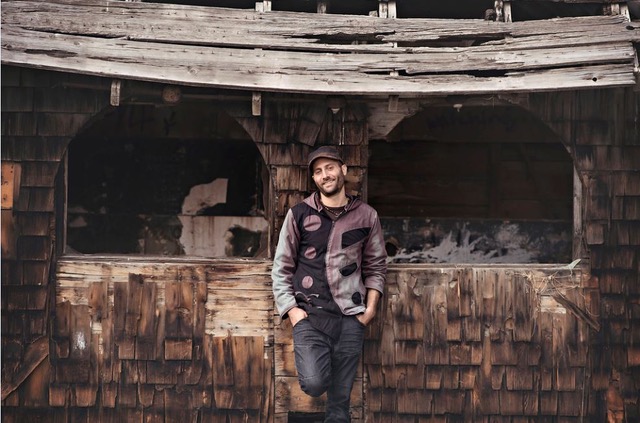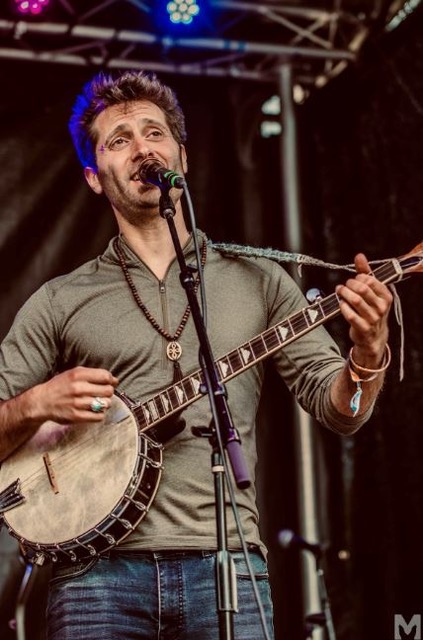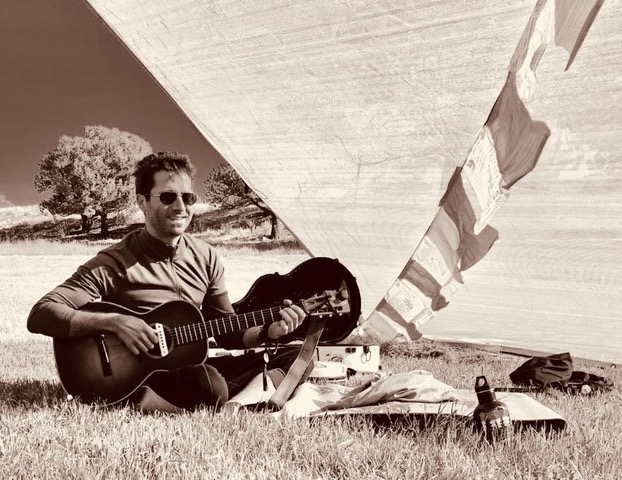
(Raffaella Mezzanzanica)
The first time I came across Dango Rose was a few years ago, when I started listening to Elephant Revival, a band he co-founded and whose style was so unique to be defined as Transcendental Folk.
Unfortunately, in 2018 Elephant Revival went on hiatus and since then, in a journey of personal healing, Dango Rose has published a series of singles, the latest of which is Ring Out, released on September 25th. Not only does Ring Out welcome a new approach for Dango Rose with a fusion of traditional styles, protest and poetry but it also represents his return to a more traditional approach in the songwriting process.
“Ring Out emanates the exuberance of southern Gospel, the anti-establishment of 60’s Folk and Punk Rock, the grit and grease of old-time music and the spiritual transcendence of a great poet. Ring Out is a call for unity amidst this turbulent and incendiary time.” (Ring Out Press Release).
There’s a sort of magic when you listen to Dango’s songs and Ring Out is no exception. His music is like a tattoo on your heart and soul.
“I just hope the songs are able to reach the ears of those that are meant to hear. It’s an act of service.”
This is what Dango Rose tells in the interview below. But there’s more to find out about his journey into the music world as musician/singer/songwriter as well as his feelings about playing with Colorado Symphony Orchestra at the amazing Red Rock Amphitheater.
Q.: I’m curious to know more about you. Where are you from? How did you start getting into music? Who are your references as a musician/singer/songwriter?
D.R.: I’m originally from Chicago and got my start in the basement and garage with my friends, like so many do…However, I quickly started taking some evening classes at The Chicago Old Town School of Folk Music which was highly motivational. Thereafter, a bluegrass band moved in next door named “Cornmeal.” Witnessing their rehearsals and watching them grow as a band was inspirational at that time, as it shifted my focus into more acoustic music and traditional forms.Thereafter, I fell in love with a girl in Southwest Virginia and her family introduced me to traditional Appalachian Music. Then I played in a street trio on the streets of New Orleans.The next obvious step was to join a cult-punk old-time string band in Colorado called High on the Hog. We toured the country with road maps and an old Panasonic cell phone for a couple few years. Not surprisingly, I soon joined an all-female string band called Uncle Earl and then made a move to Woodstock New York to join The Mammals. I was fortunate enough to spend some nights with Pete Seeger during this time. I met all the folks from Elephant Revival at different music festivals and gatherings around the country and called together the band in Colorado in 2006 after a two-year stint in Tahlequah Oklahoma.
Q.: One of the first experiences you had in the music world was traveling in the US and internationally in touring bands. Would you tell more about that period?
D.R.: Well, I suppose I accidentally answered that in question #1. There were more bands in the mix of touring, yet those are the times and stories that stand out. However, in New Orleans I was picked up off the street by David Batiste, father of the legendary Batiste Family, and was taken to a jazz-fest workshop at Saint Augustine High School to play on stage with The Meters and other amazing New Orleans jazz & heritage musicians. That changed my life forever and inspired me to choose music as my path.
Q.: In 2006, you co-founded Elephant Revival, a band formed by incredible musicians. How did you guys meet?
D.R.: I met Bridget dancing in the rain at a festival in Keystone Colorado in 2003. Thereafter, we met Bonnie at The Walnut Valley Bluegrass Festival in Winfield Kansas that same year. We heard each other before we found each other, instruments echoing through the campgrounds. Thereafter, I met Daniel Rodriguez throwing horseshoes at Webb’s World of Fun in Ponca City Oklahoma. I met Sage at Winfield once again in 2006; I suppose one could say he was the missing link. Others had met him earlier. Daniel and Bonnie had met earlier as well. Charlie and I met in 2003 also, though I can’t quite remember where, yet we all ran together, even so far as Lassen Volcanic Park in Northern California, because why ~ where else would you go?
Q.: You were all pretty unique, being all multi-instrumentalists, as was the sound of the band…a mix of Celtic, folk, Americana, and psychedelia which has been defined as “Transcendental Folk”. Would you please elaborate more on this?
D.R: Honestly, my friend Sam Burchfield recently brought Henry David Thoreau’s Walden out to Colorado with him when we joined forces to play that Elephant Collective Presents show at the end of August. We’d read passages from it every day while he was out here. I suppose we followed similar principles in our life while the band was formulating, and I believe that could be heard through the music. That said, it was a journalist chap named Marc Tonglen that came up with it all….I haven’t a clue what happened with him.
Q.: You had the chance to play in an amazing location like Red Rocks Amphitheater, and also together with the Colorado Symphony Orchestra. If you had to describe the feeling of being there and playing there to someone like me who has never had the chance to attend a concert there, what would you say?
D.R.: There’s a magic at Red Rocks that is indescribable yet is totally accessible. Being in the crowd feels just as magical as being on stage. Amazingly, the amphitheater somehow feels like a 9,500 seat living room. Playing with the symphony is such a joy. Those experiences with the CSO changed the way I approach music, mostly with regard to how I approach bass playing and production work with absolute intentionality and precision. Though I must say, I’m glad I learned how to play on mind-altering substances. Would’ve never made it into the symphony without em.’
Q.: After being part of a band you’ve contributed to co-found for 12 years, how was having to deal with the end of it?
D.R.: At the beginning I created a series of satire videos called #Hiatus. At first, I thought the humor was a good way to bridge the gap of time. However, the episodes started taking on much more of my actual reality. Right after the band split, I jumped right into production work and Artist Empowerment Coaching. This was fulfilling, yet at the same time I wasn’t paying attention to the inner-voice, the inner-artist. So, I transitioned again in late 2019…Then of course, the pandemic soon hit, yet in some sense I’d already been on #Hiatus for two years. One clarification here — there has never been an announcement that the band is officially over. Any reference of that is not an official statement by the band. That said, I’m also not living in denial or lying in wait anymore. However, to answer your question, it was absolutely heartbreaking. I put my entire lifeblood into the entity, and the past two and a half years has been a stretch of immense growth and healing.

Q.: Since then, you’ve been involved in many different activities and collaborations. I was absolutely impressed when I saw that amazing project, called “Music in the Dark”, you took part in. I’m sure it must have been quite an emotional experience for everybody. Would you tell more about it?
D.R.: Ah yes…. The Blind Café. My buddy Rosh started this about a decade ago after an experience he had in Iceland of a similar nature. I’ll just take this right from the website (www.theblindcafe.com).
“By ‘positively’ engaging people socially in 100% darkness with live music, meaningful discussion & the act of breaking bread in communally…without the distractions of visual conditioning, social etiquette, and cell phones…we explore how we can positively impact the quality of how people relate to themselves and others.”
I look forward to performing with The Blind Café’s “Music in the Dark” Series once we are able to all meet together again in enclosed spaces.
Q.: In the meantime, you’ve published a series of singles like “Desert” in 2018, “A La Glory”, “Faultlines” and “Symbols” in 2019 and, of course, “Ring Out” which premiered through Glide Magazine on Sept. 21st. How was being back to create your own music without being part of a band?
D.R.: Honestly, it’s a transformative process of healing. I just hope the songs are able to reach the ears of those that are meant to hear. It’s an act of service. I write in many different styles alongside many different collaborators, and I look forward to sharing more sides of my creative voice by releasing four EP’s of original material I’ve recorded over the past twelve years (when off the road with Elephant Revival). I’ll be releasing these toward the end of 2020 and throughout 2021 while also focusing on producing and recording more new material. Oh, I’ve also got another single called “Life’s Too Short” planned for release toward the end of November.
Q.: I would define “Ring Out” as a “protest gospel”. What’s the background of this song? How was it conceived?
D.R.: The process was kind of seamless on this one…My production partner Evan Reeves sent over a voice memo of a guitar lick. It struck a chord immediately and I sent back the top line melody with complete lyrics in 15 minutes. He then recorded a keeper guitar track, sent it over, I laid down vocals on an SM-545 and then a simple bass line. We sent it over to our friend Michael Cleveland (Grammy Award-Winner) to lay down the fiddle and then on over to Eric Moon to lay down the keys. Helen Simms and Evan then laid down the background vocals, and there you have it. Southern Gospel Protest Song done and in the books. Love it when it happens this way.
Q.: When I read what Cynthia D. Davis of Finding Folk wrote about you (“In a time when everyone’s struggles have been magnified and the world is heavy with hurt, it is the artist, the musician and the poet who remind us how to unite. As I listen, Dango reminds me at the end of the day, we do have each other and we do have a voice,”) I immediately thought that this is exactly my view and the reason why music has always been part of my life. Her words do completely resonate with your song and with me. How big is the power of music and how should artists use it?
D.R.: Music informs every aspect of my life. I wouldn’t say it’s always come easy to me; I’ve definitely had to work at it. Yet it makes up nearly every part of my day and partitions my dreaming mind as I sleep. That said, there’s no right or one way to ‘use’ it. For me, it’s about transformation and healing, and bringing forth positive change in the world. With Elephant Revival, it was about “bridging the gap of separation between us through the revelry of song and dance.” What a gift this life has given us!
Q.: And, of course, I have to ask you about Elephant Collective, a production house, artist development agency and media platform built to celebrate each other in a dynamic state of inclusion and whose aim is “to create synergy through music and art”. Tell me more about this new way of promoting and producing art.
D.R.: I’d say it’s about inclusion rather than exclusion…What can we create when we work together on our art? The biggest focus currently is on songwriting collaborations and production, remote or in person, so please feel free to reach out if you’re a songwriter looking for songwriting and production support on your songs!
Q.: And last but not least, a curiosity…”Elephant Revival”, “Elephant Collective”…well, the elephant is a constant figure and I’m sure it’s been chosen as a symbol. Am I right?
D.R.: I suppose it has.
Here’s a little excerpt from a Westword Article from 2013…
“Interestingly, the whole thing started with just Rose, busking for zoo visitors on the north side of Chicago. That’s where the band’s name comes from: an empty elephant pen at Lincoln Park Zoo. The bare cage and the story behind it left a deep impact on Rose. The pair of elephants who’d lived in that cage had both died after a sudden separation. Suddenly, turning his impromptu solo performances for street crowds into something more formal became a priority for Rose. “It was this planted seed, this call to arms,” he says. “It was the spark of an idea: ‘Let’s get the band together.’“
And then…. There’s always Ganesha….

Find out more about Dango Rose, Elephant Revival and Elephant Collective:
Dango Rose Website & Socials
https://www.instagram.com/dangorose/?hl=en — @dangorose
Elephant Revival Website & Socials
https://www.instagram.com/elephantrevival/ — @elephantrevival
Elephant Collective Productions
https://www.instagram.com/elephantcollectivetribe/ — @elephantcollectivetribe
Pictures courtesy of Dango Rose
